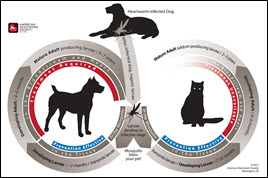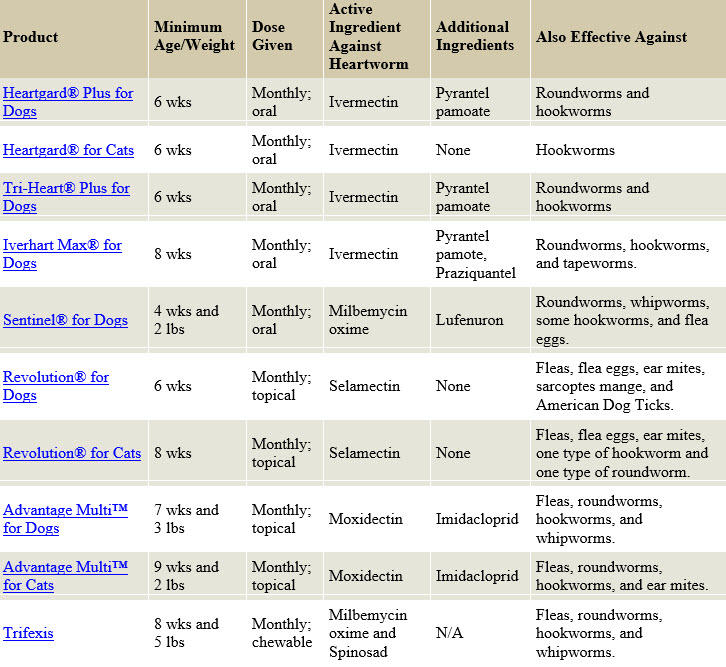| What is heartworm disease? Heartworm disease is a serious and potentially fatal disease diagnosed in all 50 states. It is caused by worms that live in the heart, lungs and blood vessels of affected pets, causing severe lung disease, heart failure and damage to other organs in the body. Heartworm disease affects dogs, cats and ferrets as well as other mammals including wolves’ coyotes, foxes and sea lions. |
| How is heartworm transmitted? Heartworms are spread through mosquitos infected with the heartworm larvae. The larvae migrate from the bite wound through the dog’s body until they reach the heart and blood vessels of the lungs. This process takes approximately six months. The larvae mature in the dog’s body and reproduce and release immature heartworms, known as microfilariae, directly into the dog’s blood. Adult worms can grow up to 12 inches in length, can live 5-7 years in dogs and up to 2 or 3 years in cats. |
Signs of Heartworm Disease
In the early stages of the disease, many dogs show few symptoms or no symptoms at all. Symptoms will develop the longer the infection exists. Active dogs, dogs heavily infected with heartworms or those with other health problems show pronounced clinical signs.
Symptoms of heartworm disease may include a mild persistent cough, reluctance to exercise, fatigue after moderate activity, decreased appetite and weight loss. As it progresses, pets may develop heart failure and the appearance of a swollen belly due to excess fluid in the abdomen. Dogs with a large number of heartworms can develop a sudden blockage of blood flow within the heart leading to a life-threatening form of cardiovascular collapse. This is called caval syndrome and is marked by a sudden onset of labored breathing, pale gums and dark bloody or coffee colored urine. Without the prompt surgical removal of the blockage, few dogs survive.
Symptoms of heartworm in cats can be very subtle or very dramatic and may include coughing, asthma-like attacks, periodic vomiting, and lack of appetite or weight loss. Occasionally an affected cat may have difficulty waking, experience fainting or seizures, or suffer from fluid accumulation in the abdomen. Unfortunately, the first sign in some cases is sudden collapse of the cat or sudden death.
Heartworm disease is a serious, progressive disease. The earlier it is detected, the better the chances the pet will recover. There are few, if any, early signs of disease when a dog is infected with heartworms, so detecting their presence with a heartworm test administered by a veterinarian is important. The test requires just a small blood sample from your dog, and it works by detecting the presence of heartworm proteins. Some veterinarians process heartworm tests right in their hospitals while others send the samples to a diagnostic laboratory. In either case, results are obtained quickly.
Heartworm Testing
All dogs should be tested annually for heartworm infection, and this can usually be done during a routine visit for preventive care. Following are guidelines on testing and timing:
Heartworm infection in cats is harder to detect than in dogs, because cats are much less likely than dogs to have adult heartworms. The preferred method for screening cats includes the use of both an antigen and an antibody test (the “antibody” test detects exposure to heartworm larvae). Your veterinarian may also use x-rays or ultrasound to look for heartworm infection. Cats should be tested before being put on prevention and re-tested as the veterinarian deems appropriate to document continued exposure and risk. Because there is no approved treatment for heartworm infection in cats, prevention is critical.
Heartworm Preventatives
In the early stages of the disease, many dogs show few symptoms or no symptoms at all. Symptoms will develop the longer the infection exists. Active dogs, dogs heavily infected with heartworms or those with other health problems show pronounced clinical signs.
Symptoms of heartworm disease may include a mild persistent cough, reluctance to exercise, fatigue after moderate activity, decreased appetite and weight loss. As it progresses, pets may develop heart failure and the appearance of a swollen belly due to excess fluid in the abdomen. Dogs with a large number of heartworms can develop a sudden blockage of blood flow within the heart leading to a life-threatening form of cardiovascular collapse. This is called caval syndrome and is marked by a sudden onset of labored breathing, pale gums and dark bloody or coffee colored urine. Without the prompt surgical removal of the blockage, few dogs survive.
Symptoms of heartworm in cats can be very subtle or very dramatic and may include coughing, asthma-like attacks, periodic vomiting, and lack of appetite or weight loss. Occasionally an affected cat may have difficulty waking, experience fainting or seizures, or suffer from fluid accumulation in the abdomen. Unfortunately, the first sign in some cases is sudden collapse of the cat or sudden death.
Heartworm disease is a serious, progressive disease. The earlier it is detected, the better the chances the pet will recover. There are few, if any, early signs of disease when a dog is infected with heartworms, so detecting their presence with a heartworm test administered by a veterinarian is important. The test requires just a small blood sample from your dog, and it works by detecting the presence of heartworm proteins. Some veterinarians process heartworm tests right in their hospitals while others send the samples to a diagnostic laboratory. In either case, results are obtained quickly.
Heartworm Testing
All dogs should be tested annually for heartworm infection, and this can usually be done during a routine visit for preventive care. Following are guidelines on testing and timing:
- Puppies under 7 months of age can be started on heartworm prevention without a heartworm test (it takes at least 6 months for a dog to test positive after it has been infected), but should be tested 6 months after your initial visit, tested again 6 months later and yearly after that to ensure they are heartworm free.
- Adult dogs over 7 months of age and previously not on a preventive need to be tested prior to starting heartworm prevention. They, too, need to be tested 6 months and 12 months later and annually after that.
- If there has been a lapse in prevention (one or more late or missed doses), dogs should be tested immediately, then tested again six months later and annually after that.
Heartworm infection in cats is harder to detect than in dogs, because cats are much less likely than dogs to have adult heartworms. The preferred method for screening cats includes the use of both an antigen and an antibody test (the “antibody” test detects exposure to heartworm larvae). Your veterinarian may also use x-rays or ultrasound to look for heartworm infection. Cats should be tested before being put on prevention and re-tested as the veterinarian deems appropriate to document continued exposure and risk. Because there is no approved treatment for heartworm infection in cats, prevention is critical.
Heartworm Preventatives



 RSS Feed
RSS Feed